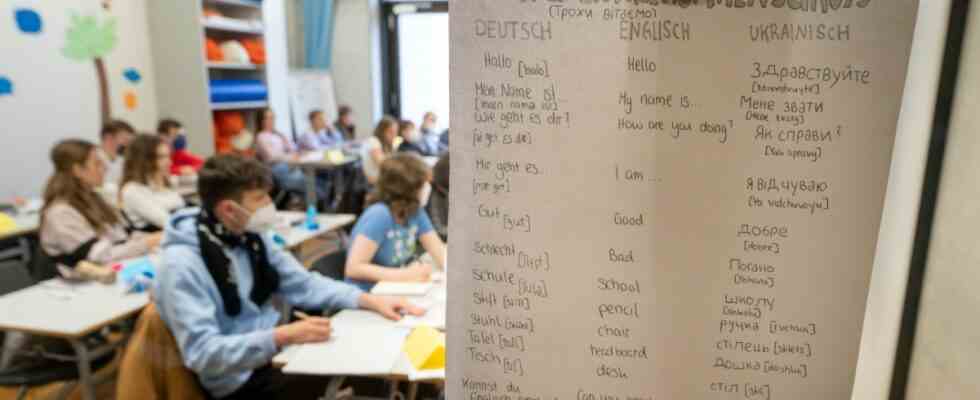A petite woman with long black hair sits on a chair in the auditorium of the Trudering High School in the middle of a discussion group. Her name is Alina Golota, a Ukrainian. She fled from Butscha to Munich with her children just a few weeks ago – from Butscha of all places, which is currently dominating the news there because of the probable war atrocities.
What parents, teachers and the director of this school have achieved in the past three weeks – all this is bundled like in a magnifying glass in the story of this slim woman. “I came to Germany full of fear,” she says. “My children are traumatized.”
It is thanks to the commitment of the school community that she is sitting here today. Her daughter attends the so-called welcome class along with 19 other children and young people from Ukraine. She herself, who worked as a child psychologist in her home country, is now taking care of the war children’s concerns. She was warmly welcomed, she says. “Many thanks to the director Ms. Asam, thanks to all of Germany.”
The welcome class was also worth stopping by in Trudering for the Bavarian Prime Minister Markus Söder (CSU) and Minister of Education Michael Piazolo (Free Voters). But it is difficult for a round of talks to reflect the lifeblood and the hard nights of individual parents and teachers who made this class possible in the first place.
Because: Even if the ministry made funds available quickly and unbureaucratically so that an extra Ukrainian-speaking teacher could be hired – the initiative for the welcome class and its organization lay exclusively with the school. Registrations had to be filled out with the help of translation software, timetables had to be drawn up, websites designed, books bought and last but not least: lessons had to be held.
There are now 389 so-called pedagogical welcome groups throughout Bavaria. To date, almost 9,600 Ukrainian students are registered at Bavarian schools. In Munich there are 1,300, according to Bettina Betz from the state school board. In the welcome groups or classes, the pupils should first be taught German so that they can later be integrated into the regular classes. Those who already speak German well are immediately taught in regular classes. At the grammar school in Trudering, there are four young people. They were placed in the tenth grades and a seventh.
Prime Minister Markus Söder (CSU, middle of the picture) and Minister of Education Michael Piazolo (Free Voters) talk to children in class.
(Photo: Peter Kneffel/dpa)
Markus Söder does not spare praise for the school community: “Of course we have to try to turn the super commitment of the individual into an organized process.” This is already in progress: so-called steering groups are currently being set up in the municipalities, in which representatives of the individual school types sit.
The state education authorities are in charge. School-age children and young people from the Ukraine are recorded centrally here and then distributed evenly to the individual schools. It is taken into account whether the schools have enough staff to be able to fulfill the additional tasks.
After the Easter holidays, Galina Samoschtschin takes care of the German lessons in the welcome class at the Trudering Gymnasium. Two hours a day are scheduled, the rest of the time the children are then placed in age-appropriate regular classes.
Samoschtschin was born in Kyiv and came to Germany as a refugee child 30 years ago. “Back then, I was simply put into the first grade and couldn’t speak any German. Up until the fourth grade, my language of communication was crying and no.” Therefore, the work in the welcome class is a matter close to her heart. The girls and boys make it easy for her. “I didn’t expect to meet such motivated children,” she says. “Even during the break, five remain seated and report further questions.”

